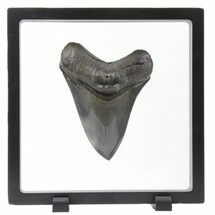This Specimen has been sold.
1.4" Fossil Llama Canine Tooth - Florida
This is a cool, 1.4" long fossil Llama canine tooth from Pleistocene aged deposits in Northern Florida. It comes in an acrylic display case.
About Palaeolama
Palaeolama mirifica is an extinct species of camelid that lived in North and Central America during the Pleistocene epoch, approximately 2.5 million to 10,000 years ago. Unlike the camels of today, Palaeolama mirifica resembled a cross between a modern llama and camel, yet with some unique adaptations to its environment. It had long, slender legs, which suggest it was adapted for running and possibly for traversing open plains or semi-arid regions. Its body was relatively compact, with a graceful neck, more llama-like than the longer-necked camels of Asia and Africa.
Fossils of Palaeolama mirifica have been found across various parts of the United States, particularly in the southeast, and extending down to Central America. The presence of this species in both temperate and tropical areas suggests that it had a broad ecological tolerance, capable of surviving in diverse climates. The diet of Palaeolama mirifica likely consisted of a mix of grasses and leafy vegetation, indicating a browsing and grazing lifestyl
Palaeolama mirifica is an extinct species of camelid that lived in North and Central America during the Pleistocene epoch, approximately 2.5 million to 10,000 years ago. Unlike the camels of today, Palaeolama mirifica resembled a cross between a modern llama and camel, yet with some unique adaptations to its environment. It had long, slender legs, which suggest it was adapted for running and possibly for traversing open plains or semi-arid regions. Its body was relatively compact, with a graceful neck, more llama-like than the longer-necked camels of Asia and Africa.
Fossils of Palaeolama mirifica have been found across various parts of the United States, particularly in the southeast, and extending down to Central America. The presence of this species in both temperate and tropical areas suggests that it had a broad ecological tolerance, capable of surviving in diverse climates. The diet of Palaeolama mirifica likely consisted of a mix of grasses and leafy vegetation, indicating a browsing and grazing lifestyl
SPECIES
Palaeolama mirifica or Hemiauchenia macrocephala
AGE
LOCATION
Northern Florida
SIZE
1.4"
CATEGORY
ITEM
#308249
We guarantee the authenticity of all of our specimens.
 Reviews
Reviews












